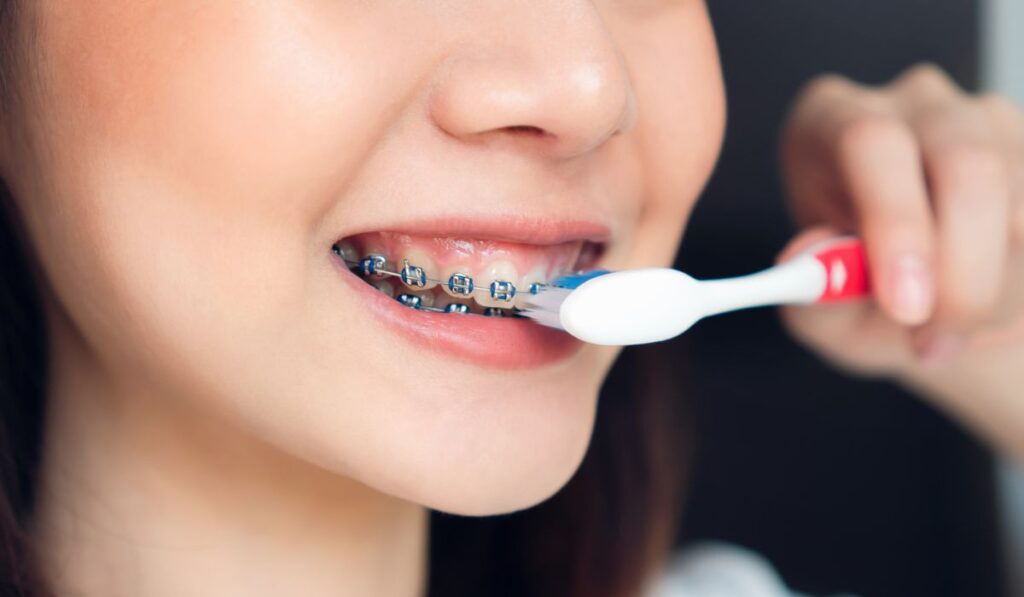Perhaps your braces have been on for a while now, and you’re getting used to having the extra hardware in your mouth. Your cleaning routine is on point, and you’re able to speak normally without any difficulty. However, you’re starting to see and feel an irritation in your gums that you didn’t have before you got your braces. What’s going on, and what should you do about it?
Braces can have a negative impact on your gums mainly by making your teeth harder to clean. Bacterial growth and inflammation from poor dental hygiene can be caused or worsened by transitioning to braces and not cleaning as well as is needed. Flossing and brushing regularly will prevent gum issues.
There’s no need to continue in discomfort. Let’s look at the ways your dental braces may damage your gums, how to treat such damages, and also how to prevent them from happening in the first place.
How Can Braces Damage Your Gums?

The way braces realign your teeth and jawbone requires putting gentle yet constant pressure on them. To achieve maximum pull and more effective results, the wires of most traditional braces are anchored around your back teeth, and the brackets are glued onto your teeth.
The process of making that happen can have a negative impact on the gum tissue in your mouth, which is a naturally sensitive mucosal tissue.
There are several ways damage to gums can happen.
Redness and Irritation
Mild redness and irritation during the first few weeks of having braces are normal side effects since the process of fixing your braces can cause friction burns on the gum line tissue surrounding the teeth, where the brackets and wires are fixed.
These issues should go away on their own with proper aftercare.
Swelling
Since braces can make it difficult to clean your oral cavity, there’s a higher possibility for bacterial accumulation that leads to the build-up of dental plaque.
If you see swelling on your gums after you get your braces, it could be because of the gum inflammation that can occur with the accumulation of dental plaque.
Gum Sensitivity
Braces push and pull on your teeth to get them aligned in a more desirable manner, which can affect the jawbone and the gum tissue surrounding the teeth, causing sensitivity.
Recessed Gums
Gum recession is a condition where your gum tissue pulls away from the teeth, exposing the root of the teeth. This is not caused by braces alone, but your oral hygiene during the braces treatment can contribute to developing gum recession.
Periodontal Pockets
If you’re starting to see “pockets” or small spaces surrounding your teeth, close to where the gum tissue should be connected to the teeth, you need to see your orthodontist immediately. This may be a sign of tissue erosion that is rarely connected to wearing braces and should be treated immediately.
Can Braces Reverse Gum Recession?
Once your gum tissue has recessed, it can’t be reversed with orthodontic treatment. However, braces are able to make small cosmetic improvements to your recessed gums.
Moreover, some of the conditions that are directly treated by braces, such as crowded teeth and other similar dental malocclusions, often increase the risk of gum recession later in life.
Therefore, by getting them treated and fixed with braces, you’re also preventing a future possibility of gum recession.
If you have risk factors for gum recession such as autoimmune diseases, diabetes, and similar underlying medical conditions, let your orthodontist know about it during the initial discussion so they can consider those conditions when preparing the best orthodontic treatment for you.
How to Treat Swollen or Damaged Gums
If you see any kind of inflammation or damage on your gums related to braces, your first step should always be to make an appointment with your orthodontist.
Swelling of the gums could be a symptom of a larger issue, such as an allergy to a certain type of metal. Meanwhile, the following home remedies will help minimize the damage and to reduce any pain and soreness.
- Gently cleaning the area
- Mixing salt with lukewarm water and rinsing the mouth to get rid of any mild bacterial growth
- Applying a warm or cold compress to reduce pain and swelling
- Drinking a lot of water
- Avoiding sticky, sugary, or spicy food that can irritate the gum tissue further
How to Prevent Your Braces From Damaging Your Gums

The first step to preventing any kind of damage within your oral cavity while undergoing orthodontic treatment is to have a consistent and thorough oral hygiene routine.
If you’re not sure how to properly clean your mouth when you have your braces, let your orthodontist know and they will be happy to guide you through the process.
Here are some practical steps that you can take to prevent your braces from damaging your gums.
- Use a toothbrush with soft bristles (on Amazon)
- Brush gently to clean thoroughly close to the gum line
- Floss and rinse daily
- Eat braces-friendly food
- Use orthodontic wax (on Amazon)
- Get regular dental checkups to adjust braces
Generally, upgrading your home care devices can be very helpful. We recommend using a Waterpik (on Amazon), orthodontic floss picks (on Amazon), and an electronic toothbrush (on Amazon). These innovative devices can make a huge difference in your comfort and overall oral health.
The Final Word
Dental braces treatment has the ability to boost your confidence so you can smile more often, and it can dramatically improve your oral as well as overall health.
To make sure you have a pleasant experience while undergoing this effective orthodontic treatment, make sure you keep good oral hygiene habits and see your orthodontist regularly to prevent any issues that may arise.


